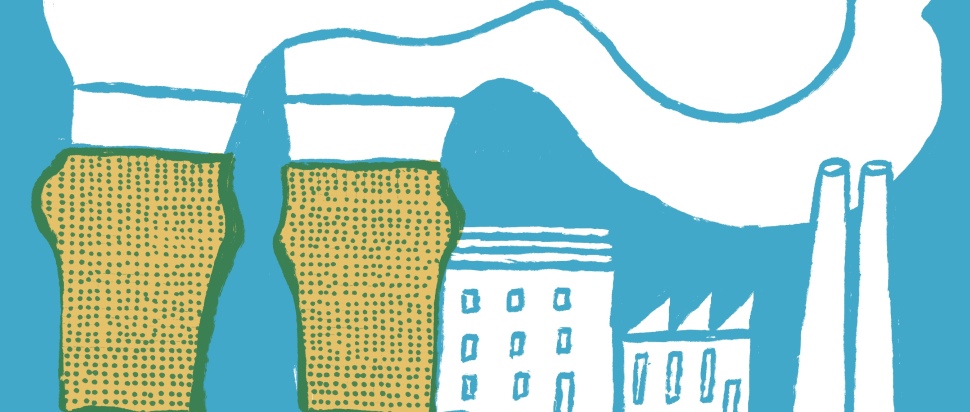Drinking Climate: Alcohol and the environment
The climate is changing – and so is alcohol. We speak to Cork & Cask about the science behind these changes, how wineries are approaching the crisis, and where hope lies for the industry
You’re down to the second, maybe third, bottle of wine for the table. Voices are getting higher in pitch and cheeks are beginning to flush. At one point, statistics were mentioned, sources cited. But now everything’s a little fuzzy and once semi-coherent critiques on capitalism have misshapen into a string of swears. Eventually, there’s nothing much to say: the climate crisis is happening and a top-up of Sauvignon Blanc can’t stop it.
Perhaps these conversations shouldn’t happen after consuming above the daily recommended units but, frankly, the two are connected: alcohol and the climate crisis. We can almost taste it – or, at least, a wine expert can.
Cork & Cask is an independent wine, beer, and spirits company. Their Marchmont-based shop is now managed by India Parry-Williams, a wine merchant and expert who has worked with the company for nine of its ten years. With a specialism in organic, biodynamic and natural wine, the climate crisis features heavily in Parry-Williams’s work and the industry more widely.
"A lot of places that previously maybe didn't make great wine or were not well known for making exceptional wine are really going to come into their own," says Parry-Williams. "This increased sunshine isn't bad for everybody."
But, as Parry-Williams points out, the climate crisis isn’t just the planet getting hotter – it’s frosts and wildfires, droughts and floods. "If a big hailstorm hits for an extended period of time, there's nothing you can do to protect your thin-skin delicate fruit, that's it – that's gone," she says. "That’s an entire vintage and your whole livelihood."
This will, of course, take its toll on independent wineries, keen to maintain tradition. "They're not using chemicals to combat this, they're not acidifying their wines," says Parry-Williams. When it comes to those larger wineries, however, it’s a different story. With extensive chemical addition and filtering already in place, the big names on the shelf will cope just fine. "Jacob’s Creek won’t change." It’s unfortunately to be expected: the climate crisis and capitalism are inextricably linked in both cause and result.
"Instead of combating climate change on a real meaningful level, we are seeing legislation change in order to enable it," Parry-Williams says. She notes, for instance, that 2021 saw France's Institut National de l'Origine et de la Qualité approve six new grape varieties within the Bordeaux region to accommodate for climate change. Although it’s key that wineries can adapt to current circumstances, such policy change must come alongside moves towards climate justice.
But it’s also important to be mindful about how we cope with the climate crisis on a personal level. With the IPPC reporting that the crisis is expected to increasingly impact our mental health, our drinking habits are certainly something to watch. Moreover, increased sunshine means that "the sugars in the grapes that then cement to make the wine are going to go up and up and up," explains Parry-Williams. "And the more sugar, the more alcohol right – on a very basic level." These higher alcohol by volume (ABV) levels will seem miniscule to the average drinker; nonetheless, it might be worth double-checking what you’re drinking and, perhaps, how much of it.
Although the climate crisis is impacting alcohol, the reverse is also true. With often intensive farming methods and excessive packaging, the production of many alcohols can be fairly harmful to the environment itself. As ever, it’s easy to feel consumed by the guilt of that one plastic straw and its cost to the Earth. But it’s primarily governments and large corporations that should be held accountable; for individuals and communities, climate action is worth a lot more than climate guilt. Don’t worry: you’re allowed to enjoy a beer.
What’s more, Scotland is beginning to boast an increasingly environmentally-friendly alcohol industry. Similarly to Cork & Cask, Glasgow’s Brett Shop prides itself on stocking low-intervention and biodynamic wines. Meanwhile, Edinburgh’s Pilot Beer is now fully vegan, marking a step away from the dairy industry and towards increased markets. Parry-Williams also runs Scotland’s only natural wine fair; it’s exciting – there’s clearly a market growing for the stuff.
It’s a subject Parry-Williams feels strongly about – so much so that April will see her lead an event titled Tasting Climate Change at Edinburgh Science Festival. She’ll be talking audiences through various wines and unpacking how the climate crisis has impacted them. Although it’s a difficult topic, Parry-Williams is clear: "I would like this to feel hopeful."
And there is, certainly, hope to be had. Parry-Williams notes that producing good quality red wine is now possible in England, primarily because of the climate crisis. That’s not to say that burning all those fossil fuels was worth it for a glass of English red; rather, Parry-Williams sees this as an opportunity to encourage individuals to drink locally and develop a sense of ownership over what we’re drinking. As she puts it, "Feeling connected to agriculture, feeling connected to soil, feeling connected to produce is so incredibly important for understanding climate change."
Stay safe, enjoy yourself, and come together for climate justice. It’s a difficult time – with or without a glass in hand.
Tasting Climate Change, Ghillie Dhu, Edinburgh, 11 Apr, 7pm, £20, part of Edinburgh Science Festival
